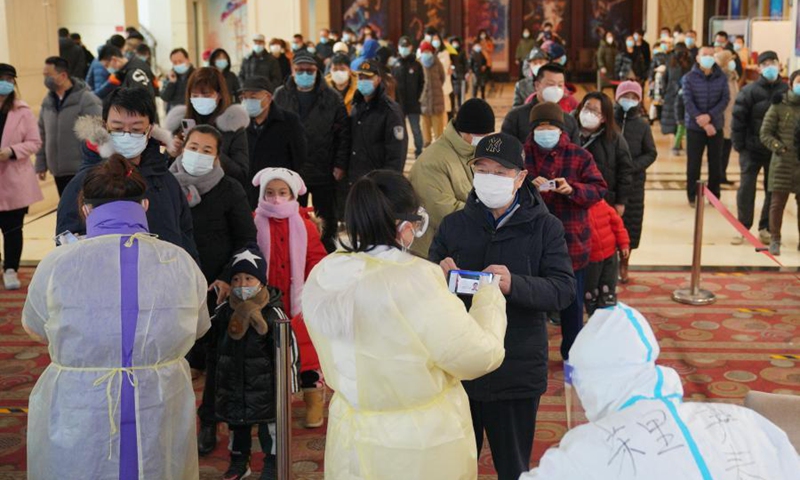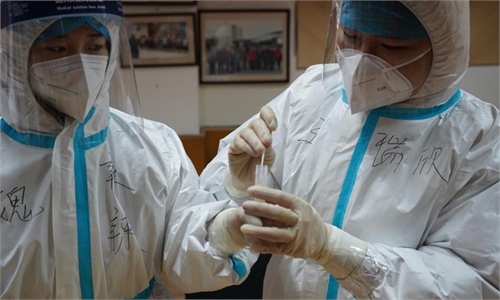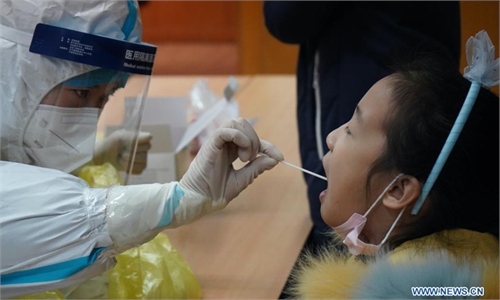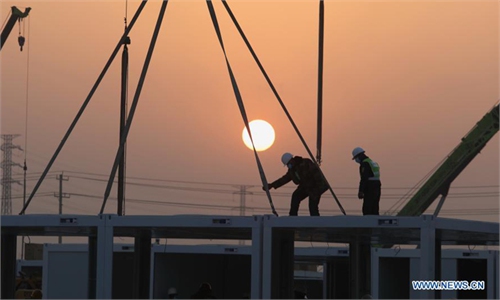Shijiazhuang strengthens home-quarantine management after media criticism of loopholes

Residents register their personal information before the COVID-19 test at a community COVID-19 testing site in Qiaoxi District of Shijiazhuang, capital of north China's Hebei Province, Jan. 12, 2021. Shijiazhuang started the second round of nucleic acid tests for all residents on Tuesday. (Xinhua/Mu Yu)
Shijiazhuang, capital of North China's Hebei Province, which has recently seen a resurgence in COVID-19 cases, has strengthened epidemic prevention and control measures in residential communities after media criticized the city's loopholes in the closed management of some old communities, as residents in these communities could go out of and into the community at will.
The city reported another 17 cases on Saturday, of whom 11 were initially asymptomatic patients, bringing the total number of confirmed cases to 791 from the recent outbreak.
Shijiazhuang on early Saturday morning announced that hierarchical management and control would be implemented from the same day, elevating Gaocheng district and Xinle city under its jurisdiction to high-risk areas.
The announcement noted that those districts and counties which had reported cases would be managed as high-risk areas and strict home quarantine requirements would be implemented.
Seven districts and counties including Qiaoxi and Luquan districts were listed as medium-risk areas in Shijiazhuang.
Shijiazhuang said on Sunday that Baijin apartments, Huarun Wanxiang community in Qiaoxi district and Guanfengjiadi residential community had been downgraded to low-risk areas.
In low-risk areas, normal production activities and life will be resumed in an orderly manner, and movement and gatherings of people will be effectively controlled. In principle, people will not move across counties (cities or districts), and cross-infection will be strictly guarded.
Also according to the latest announcements, each residential community must strictly comply with the requirements according to its risk level, and not arbitrarily add new restriction measures.
A local resident surnamed Chen, who lives in the low-risk Gaoyi county, told the Global Times on Sunday that people are requested to show their electronic keys, scan health codes and have their temperatures checked to enter their communities.
The announcements came after Chinese media outlet cnr.cn revealed on Friday that there were loopholes in home-quarantine management in some old residential communities in Xinhua district.
An editorial on cnr.cn said on Friday that as the property management system in the old communities was flawed, home quarantine completely relied on residents' self-discipline. Residents could enter and exit the community at will, and there were no people responsible for entry registration and temperature checks at the entrances to the communities, the article noted.
The article criticized the local epidemic prevention and control measures, saying that awareness alone is not enough for home quarantine management.
The closure of communities and villages is an important part of the battle against the epidemic in Shijiazhuang, so relevant departments must take effective measures as soon as possible to try to plug loopholes and build an airtight "firewall" of epidemic prevention and control. The measures could include adding temporary personnel for the communities' entry controls, the editorial suggested.
However, voices have begun to emerge saying that the decision by some districts to suddenly implement strict management after the criticism by cnr.cn is unreasonable.
A netizen who claimed to be a local resident in Shijiazhuang said on Sunday morning that she was upset by the move. She said some communities blocked the doors of units and prevented residents from going downstairs on Saturday.
If it was during the peak of the epidemic, such strict measures are understandable, but the outbreak has begun to ebb and such measures would cause public panic. She said the groups on her WeChat for online shopping of daily food have become very busy, as people were worried about a possible shortage of daily necessities given the "suddenly strict" management.
She expressed hopes that residential management would not be excessively corrected.




